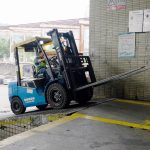Wilson Sons, the largest integrated port and maritime logistics operator in the Brazilian market, has selected ABB’s Optical Character Recognition (OCR) system for ship-to-shore (STS) gantry cranes at Rio Grande container terminal, including the QuayPro module to digitalize container stowage confirmation processes. The company has been using ABB’s automated gate systems both at its Rio Grande and Salvador container terminals since 2013. Adding Crane OCR with QuayPro to the existing gate system supports their vision to automate and digitalize terminal processes.
“This partnership means one more step towards our commitment to achieve even more efficient and sustainable operations, through technology and process automation,” said Paulo Bertinetti, Executive Director of the Rio Grande terminal.
The ABB Crane OCR solution automates the process of capturing data as containers are loaded and discharged by STS cranes. Using ABB’s advanced AI imaging technology, the system captures container numbers, ISO codes, door orientation, bolt seal presence and hazardous material labels, as well as recording images for damage inspection purposes. With the exception management system clerks can correct or adjust transactions in real time from a remote location. The solution also includes ABB MatchMaker which identifies the terminal trucks, allowing for the automated handoff between crane and terminal vehicles.
which identifies the terminal trucks, allowing for the automated handoff between crane and terminal vehicles.
“ABB Crane OCR gives us an efficiency edge while the ability to streamline the stowage process automatically represents a productivity differentiator,” said Giovanni Phonlor, Operations Director of the Rio Grande terminal. “Minimizing the risk of error on data entry means more efficient operations. Technology works hand in hand with leaner, greener operations, ready for growth in traffic and in vessel capacity,” he added.
The combination of ABB Crane OCR and the QuayPro module makes it possible to streamline the stowage confirmation process, with increased productivity as a result. The module determines the actual stowage position of containers during vessel loading operations, providing input to the terminal operating system to create an accurate outbound BAPLIE (bayplan/stowage plan occupied and empty locations message) file, in addition to confirming the accuracy of inbound stow positions. Any deviation from the load or discharge plan is reported in real time enabling the terminal to adapt to dynamic variations. In addition, crane drivers get audio-visual work instructions.
“The new QuayPro module is more than an extension of the OCR system; it will change the way container terminals operate. We are proud to further strengthen our relationship with Wilson Sons and to see the positive impact of our technology on the Rio Grande container terminal operations,” said Richard Micheli, Product Line Manager OCR, ABB Marine & Ports.
The post Rio Grande Container Terminal Efficiency appeared first on Logistics Business® Magazine.


